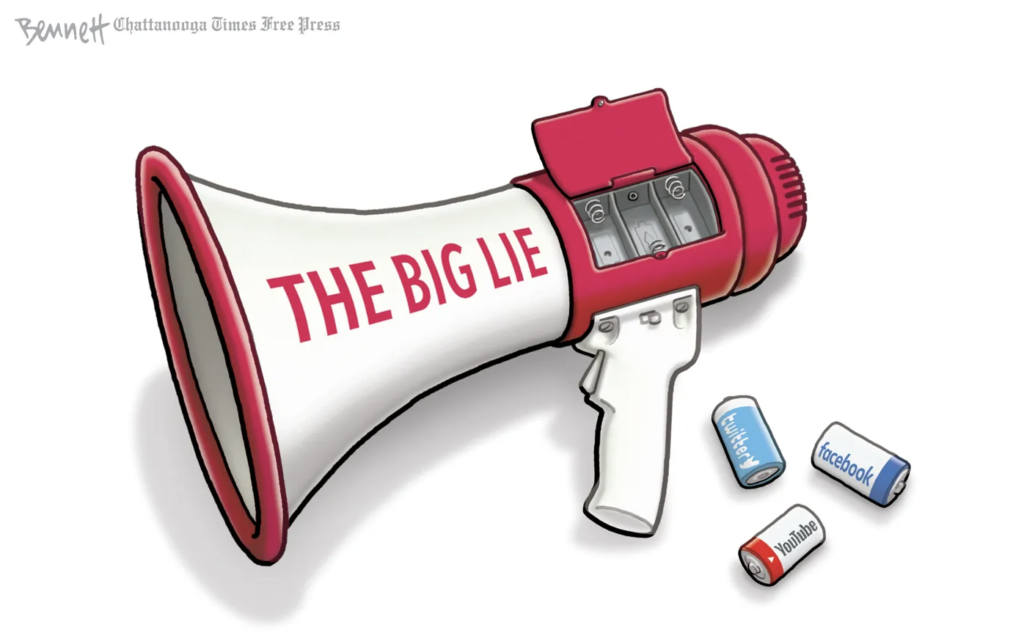Guest column by Noel Holston
Athens, Georgia — Throughout the day, and especially around evening news time, Atlanta’s commercial television stations are bombarding viewers in the greater metro area with paid political advertising. The primaries for Georgia governor, U.S. Senate and other races are just three weeks away.
One spot in particular jumps out. Former President Donald Trump, in a voice-over, endorses David Perdue for Georgia governor over incumbent Brian Kemp. Trump derides Kemp for refusing to find him the votes to overturn his loss to Joe Biden in 2020 and for failing to exercise his supposed authority to simply throw out the ballots.
This is, of course, a bald-faced lie — indeed, part of the “Big Lie” that is even now being investigated by a U.S. House select committee.

Even as a grand jury convenes in Atlanta to determine whether Trump criminally interfered in the election when he phoned Kemp and pressured him to alter election results.
Kemp and Brad Raffensperger, Georgia’s Secretary of State, both Republicans who themselves had voted for Trump, simply declined to exercise powers that didn’t have. They refused to ignore recounts and facts. They refused to cheat.
But still the ad runs and runs, with Trump kvetching about what was “stolen” from him and his supporters.
How can this be? How can these TV stations keep showing attack ads that make claims that their own news anchors, both local guys and their respective network counterparts, routinely mention only with the modifiers “false” or “baseless”? Is there no “truth in advertising” requirement?
Short answer: No.
At least not where political advertising is concerned.
I emailed my concern about this a couple of days ago to WXIA-TV, the NBC affiliate in Atlanta that I most often watch for news. What can I say? I have a crush on Andrea Mitchell.
A WXIA representative got back to me this afternoon. Here’s the reply. I’m guessing you did not know this:
“The Federal Communications Commission’s political broadcast rules actually prohibit television stations from refusing or altering political advertising from any legally qualified candidate,” WXIA’s spokesperson said.
“More specifically, the FCC says that a person who has publicly announced his or her intention to run for nomination or office, is qualified to run under the appropriate federal, state or local laws to run and has met all of the other necessary qualifications to run for and hold the office they are seeking, is permitted to purchase political advertising time within 45 days of a primary election or 60 days of a general or special election in which that person is a candidate.
“Additionally, television stations cannot censor or alter the content of political ads being run in any way. The ads must be run in their original form — even if their content differs from the ordinary program content that the station would regularly air.
“A station is also prohibited from rejecting a political ad from a candidate, despite its content. As a result, broadcast stations are not responsible for the content of those particular political ads, even if the content may be demonstrably false or defamatory in nature.” (bold italics mine)
So, even if Trump accused Brian Kemp of sheep shagging or Kemp said Trump and Perdue are having an affair, the Atlanta stations would be obligated to televise their ads uncut. And so, in similar situations, would all other federally licensed commercial TV stations in other parts of the country, including yours.
And we worry what Elon Musk is going to do with Twitter.
Note: Noel Holston is a freelance writer who lives in Athens, Georgia. He regularly shares his insights and wit at Wry Wing Politics. He’s also a contributing essayist to Medium.com, TVWorthWatching.com, and other websites. He previously wrote about television and radio at Newsday (200-2005) and, as a crosstown counterpart to the Pioneer Press’s Brian Lambert, at the Star Tribune (1986-2000). He’s the author of “Life After Deaf: My Misadventures in Hearing Loss and Recovery,” by Skyhorse.
